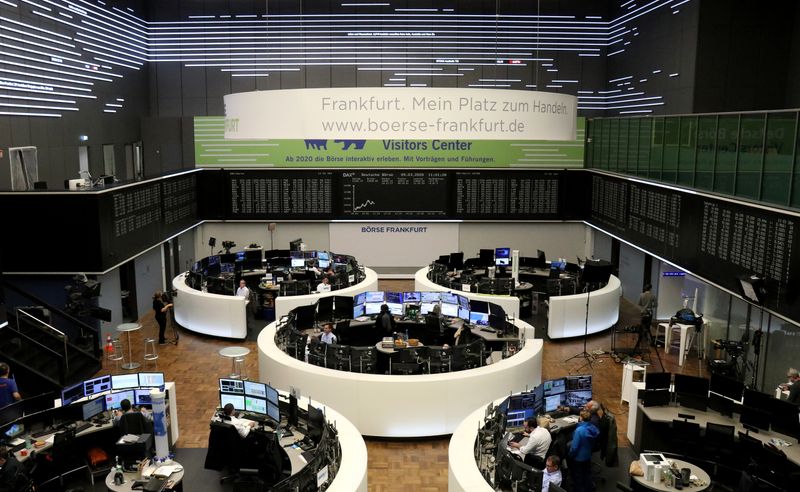By Sruthi Shankar
(Reuters) - European shares slumped on Monday, with the benchmark STOXX 600 in bear market territory, as fears of a global recession were amplified by a 25% plunge in oil prices and a lockdown in northern Italy to contain the coronavirus outbreak.
The pan-European STOXX 600 (STOXX) fell 7%, meeting the common criteria for a flip into a more negative "bear" environment, implying a 20% drop from all-time highs. The index was on course for its biggest percentage drop since June 2016, when Britain voted to exit the European Union.
European firms have now lost nearly $3 trillion in value since the rapid spread of the coronavirus sparked a worldwide selloff in February.
Europe's oil & gas index (SXEP) tumbled 13%, after Saudi Arabia launched an oil price war with Russia by slashing its official selling price and outlining plans for an increase in crude production next month. [O/R]
London's commodity-heavy FTSE 100 (FTSE) was down 6%, with oil majors BP (L:BP) and Royal Dutch Shell (L:RDSa) both off almost 20% and set for their worst day ever. A whopping 38% drop sent Tullow Oil (L:TLW) to the bottom of the STOXX 600.
"Wild is an understatement," said Chris Brankin, chief executive at TD Ameritrade. "I figured maybe we'd see a 5% or 10% drop in the oil market, but 25% down has literally just spooked the rest of the market."
All European sub-sectors were deep in the red, with growth-sensitive miners (SXEP), automakers (SXAP), banks (SX7P) and insurers (SXIP) falling between 6% and 8%.
Defensive sectors, considered safer during times of economic uncertainty, also posted slight losses.
Italy's blue-chip index (FTMIB) shed 9%, the most among regional indexes, after the government ordered a virtual lockdown across much of its wealthy north, including the financial capital Milan, in a drastic new attempt to try to contain the virus.
The government has pledged about 7.5 billion euros ($8.55 billion) in measures to aid an economy already on the brink of recession.
In the starkest warning yet of the economic damage from the health crisis, yields on 10-year U.S. Treasuries (US10YT=RR), the benchmark for global borrowing costs, dropped to a record low of 0.4258%. German 10-year bond yields (DE10YT=RR) fell to a new record at -0.8%. [US/] [GVD/EUR]
"What we're seeing is a supply driven shock, it's not a demand problem," said senior equity analyst Renata Klita, at asset manager London & Capital.
"But now with what's happening with oil, I would say it's more likely (to become a demand shock) because you have this big sector that's affected."

All eyes are now on the European Central Bank's policy meeting on Thursday, following interest rate cuts by central banks in the United States, Canada and Australia last week to soften the blow of the outbreak.